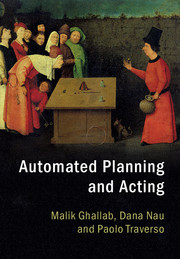Book contents
- Frontmatter
- Dedication
- Contents
- List of Algorithms
- Table of Notation
- Foreword
- Preface
- 1 Introduction
- 2 Deliberation with Deterministic Models
- 3 Deliberation with Refinement Methods
- 4 Deliberation with Temporal Models
- 5 Deliberation with Nondeterministic Models
- 6 Deliberation with Probabilistic Models
- 7 Other Deliberation Functions
- 8 Concluding Remarks
- Appendix A Search Algorithms
- Appendix B Strongly Connected Components of a Graph
- Bibliography
- Index
3 - Deliberation with Refinement Methods
Published online by Cambridge University Press: 05 August 2016
- Frontmatter
- Dedication
- Contents
- List of Algorithms
- Table of Notation
- Foreword
- Preface
- 1 Introduction
- 2 Deliberation with Deterministic Models
- 3 Deliberation with Refinement Methods
- 4 Deliberation with Temporal Models
- 5 Deliberation with Nondeterministic Models
- 6 Deliberation with Probabilistic Models
- 7 Other Deliberation Functions
- 8 Concluding Remarks
- Appendix A Search Algorithms
- Appendix B Strongly Connected Components of a Graph
- Bibliography
- Index
Summary
Chapter 2 concentrated mostly on planning with descriptive action models. Although it described some ways for an actor to receive guidance from such a planner, it did not describe the operational models that an actor might need to perform the planned actions. In the current chapter, we present a formalism for operational models and describe how to use these models for deliberative acting.
Section 3.1 describes a formalism for operational models based on refinement methods. A method specifies how to accomplish a task (an abstract activity of some kind) by refining it into other activities that are less abstract. These activities may include other tasks that will need further refinement and commands that can be sent to the execution platform. Section 3.2 describes an acting procedure, RAE, that uses a collection of refinement methods to generate and traverse a refinement tree similar to the one in Figure 1.2. It recursively refines abstract activities into less abstract activities, ultimately producing commands to the execution platform.
If we modify the refinement methods by replacing the commands with descriptive models, the modified methods can also be used for planning. The basic idea is to augment the acting procedure with predictive lookahead of the possible outcome of commands that can be chosen. Section 3.3 describes a planner, SeRPE, that does this. Section 3.4 describes how to integrate such a planner into acting procedures.
Although the formalism in this chapter removes many of the simplifying assumptions that we made in Chapter 2, it still incorporates some assumptions that do not always hold in practical applications. Section 3.5 discusses these and also includes historical remarks.
OPERATIONAL MODELS
In this section, we present a formalism for operational models of actions and describe how to use these models for deliberative acting. This formalism weakens or removes several of the simplifying assumptions that we made in Section 2.1.1:
• Dynamic environment. The environment is not necessarily static.Our operational models deal with exogenous events, that is,events due to other causes than the actor's actions.
• Imperfect information. In Section 2.1.1, we assumed that the actor had perfect information about its environment. In reality, it is rare for an actor to be able to know the current value of every state variable and to maintain this knowledge while the world evolves.
- Type
- Chapter
- Information
- Automated Planning and Acting , pp. 74 - 113Publisher: Cambridge University PressPrint publication year: 2016



